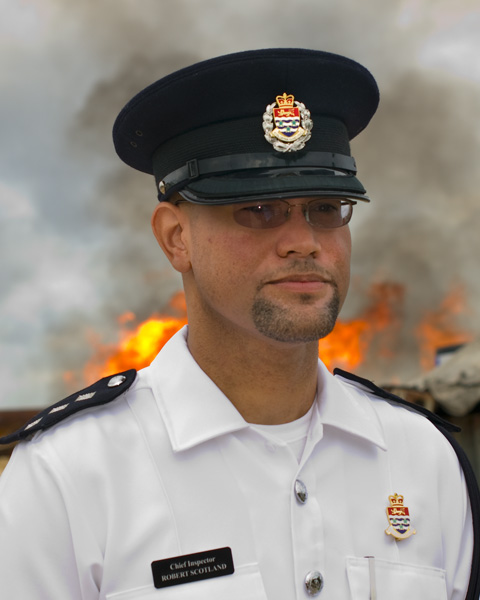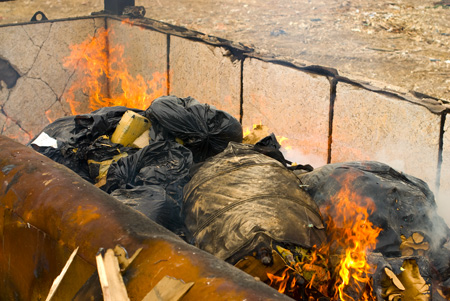Drugs go up in smoke at dump
 (CNS): In one the RCIPS’ regular burnings of illegal drugs seized in various operations or found wash up on the shore line, a significant amount of ganja and other substances went up in smoke at the dump on Friday, Chief Inspector Scotland said that the police had set fire to over 605lbs of ganja, almost 3lbs of cocaine and a small quantity of hash oil were destroyed. The drugs would have been worth thousands of dollars of profit for the dealers if they had made their way onto the streets. (Photos by Dennie Warren Jr)
(CNS): In one the RCIPS’ regular burnings of illegal drugs seized in various operations or found wash up on the shore line, a significant amount of ganja and other substances went up in smoke at the dump on Friday, Chief Inspector Scotland said that the police had set fire to over 605lbs of ganja, almost 3lbs of cocaine and a small quantity of hash oil were destroyed. The drugs would have been worth thousands of dollars of profit for the dealers if they had made their way onto the streets. (Photos by Dennie Warren Jr)

CI Scotland explained that all of the drugs that were destroyed in the controlled burning at the George Town landfill on Friday, 29 May, had been seized in various police operations or arrests where the cases were all ready through the courts and dealt with. Some of the drugs had been found along the beaches and could not be connected to a specific crime or dealer.
Category: Local News


WOW- highly intelligent move, burning the weed. Hummm the whole police dept. wanting to get high now or what? Last I checked it is the "burning" of the pot that gets you in trouble. Brillant just brillant…
People should educate themselves and not simply accept what their religious and political leaders tell them
Marijuana was made illegal in the 30’s in Utah under pressure of the mormon church (white people only church). Its purpose was to blame the poor black people for the downfall of the economy at that time. And it worked.
Educate yourself. Religious people are the most fanatic against smoking marijuana. These people are the easiest to convince of non-existing evil.
Marijuana is 100% natural medicine, non-addictive, though they allow alcohol and cigarettes to be sold in the supermarket.
Cocaine, meth, heroine etc, are the real dangers. Since they are so expensive, you need a certain "income" to be able to afford it. We all know who they are, lawyers, brokers, politicians etc. Unfortunately the make the rules here.
I have heard of police raids canceled because of certain people involved.
Hypocritical, double standards and religion and a bunch of idiots that fall for anything authority tells them,
XXXXXXX
anonymous 00:39
when did???????…… ("Marijuana is 100% natural medicine, non-addictive,")………("Cocaine, meth, heroine etc, are the real dangers")
ALCOHOL.. (king alcohol) "HAS" killed more persons directly and indirectly than any other drug & or combination of drugs have, in as long a time as other drugs have been known and used as a mind and mood altering sunbtance ……
YOU had better educate ur self 1st, b 4 u (eud’ u ma’ ca’ t) others
Sorry, but, you’re just wrong.
The "war on drugs" will never be won, because people really want drugs. Pure and simple. So the end result is that by making them illegal we are supporting international crime by handing them exclusive rights to a very very lucrative market – a market which is so lucrative largely because it is illegal.
"The drugs would have been worth thousands of dollars of profit for the dealers if they had made their way onto the streets."
…or, to put it another way, could have solved the Islands’ economic and criminal problems had the government adopted the common sense approach of legalising and taxing them.
Seriously, when is the government going to wake up and realise that the reason that my 12-year old is unable to buy a pack of cigarettes–but could likely score a joint without much hassle, is because one is legal–and the other is not?
Also, gangs exist in Cayman because there is a need to protect illicit profits and lucrative drug distribution ‘territories’. These would not exist (and therefore, neither would the gangs) if the government would just wake up and adopt a position of legalisation.
Agreed!!! And taken to its logical conclusion, the drug war ends with open warfare on neighborhood streets, as with Chris Coke.
Look how many countries are in the midst of undeclared civil wars due to the arbitrary criminalization of certain drugs… Columbia, Mexico, Jamaica, to name a few.
And why is ganja illegal but tobacco legal? What about vicodin or oxycontin? Why are those legal with a doctor’s prescription?
Holland legalized marijuana years ago and they are one of the wealthiest, cleanest and safest countries in the world.
You [have] probably never been there. Its a sewer.
Amsterdam has tried the legalized drug culture it and failed miserably. The whole notion that somehow legalizing drugs discourages or eliminates crime is a total crock. In fact the very thought process of making drugs legal will somehow result in lower crime or less drug usage, is moronic.
Amsterdam is ridden with crime, "illegal" drug smuggling and poverty. XXXX
You’re not telling me you’ve been to Amsterdam yourself are you? Because your post makes it sound like you [probably] never have, or if you did, you never tried to gain a proper understanding of the mechanics of the place.
Dutch drug policy is completely unique. It is driven by the idea that human beings should be responsible enough to decide about matters concerning their own health. The Dutch consider this a fundamental rule, for example, being the only country in the world that allows the possibility of controlled suicide (voluntary euthenasia) for terminally ill patients. Another idea behind Dutch drug policy is a conviction that hiding social negative phenomina does not make such phenomina disappear, it just drives it underground and makes the situation worse, because once concealed, illegal drug activities become far more difficult to influence and control. Applying these ideas to their drug laws, the Dutch try as much as possible to decriminalize the use of drugs,making it a private matter for each individual to devide, and not a matter for enforcement apparatus. Production, trading and stocking drugs remain a criminal offence, as in any other country.
The Dutch see the use of drugs as a health matter, similar to the use of tobacco and alcohol, and in fact not very distant from problems of obesity, alcoholism and tobacco smoking. They also point to the fact that prohibition of alcohol in the US in the years 1919-1933 brought more negative effects of increased criminality, than the positive social changes and had to be withdrawn.
Through their tolerant policies towards soft drugs, they hope to be able to better control the social phenomena of drug abuse. For example, the statistical data certifies that among young people of medium age 28 in the Netherlands, only 16% ever smoked marijuana: soft drugs when widely accessible seem to lose much of their appeal.
OK, the Dutch may not have seen much reduction in the use of drugs through their laws, but what they have managed to do is stop the dramatic increase in drug use that is evident in most other countries.
Having said all of that, Portugal are said to have made significant strides with their decriminilization framework. Portual decriminalized all drugs in 2001 and last year a study was published as to the results of this:
http://www.cato.org/pubs/wtpapers/greenwald_whitepaper.pdf
The conclusion:
Thank you for finding and linking to a more politically "conservative" source of information, than what I would have used. I simply can’t understand why otherwise sensible and intelligent individuals feel the need to become moralistic and punitive when it comes to mind-altering substances.
After100+ years of evidence that the prohibition/criminalization/punitive model does not work, should we not be ready and flexible enough to look for alternative strategies?
This does not mean that I think decriminalization is a panacea. But, would I want to be prescribed an antibiotic that has had a 100 year history of failed clinical trials? Me thinks not.
Some individuals do and will continue to abuse substances. However is justice served by making them pariahs and incarcerating them or forcing them into treatment that they do not want, at a significant cost to taxpayers?
.
It is worthy to note, that we now have long-term evidence, that decriminalization of drugs is effective in terms of reducing harm to individuals, cost to Government, and does not have the much ballyhooed negative effects.
Portugal went through this exercise and the results have been thoroughly evaluated. It may not be intuitive or "morally" acceptable, but let us look at facts. It is also a potential long-term, stable, source of revenue, much in the same way as alcohol is currently.
Will there be abuse and addiction? Of course, but that will be there anyway (as it is now). If it were regulated and taxed, the services required for treatment would be fully funded and the costs of policing and incarceration would disappear.